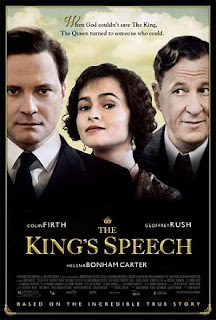
I realized I haven't reviewed a
Harry Potter movie since 2005's
Goblet of Fire (still my favorite entry in the series), and that's probably because they are a hard bunch to discuss. What can I really say about
Deathly Hallows (
Part I) that's all that different from the past six movies? Sure, the various directors have had differing takes on the world of Hogwarts, but since David Yates adopted the franchise, it has all felt a bit too bland for me. He doesn't seem to have any particular vision for these movies, so his entries feel especially interchangeable. His films, more than any others, have each been little more than a buildup to the next in the franchise, which makes it hard to enjoy the film at hand. That goes doubly so here, with a film whose sole purpose appears to be as a setup for the conclusion to the series. While this creates a number of narrative and pacing issues for the audience, it does allow, finally, for some actual character development in these later films.
I haven't read a single
Potter novel, nor do I expect I ever will. I come to this franchise purely as a curious spectator who wants to see what the fuss is about. So I suspect that I am missing out on a great deal of character development found in the last few novels that is largely being exorcised in favor of plot movement and set pieces. By splitting the final novel into two movies, however, it allows this film to slow down a bit and reexamine the central three characters. For the first time in the series, Daniel Radcliffe, Emma Watson, and Rupert Grint are allowed to take center stage without the support of a bevy of well known actors. Sure, most of the ever growing cadre of acting legends are here, but usually only in cameos. The three leads mostly do a good job anchoring the film. They still have their weak points, but they've come such a long way over the last decade. Grint, in particular, really does a fine job of conveying all the conflicting emotions going on within his character. And it was nice to see Harry actually wrestle with his parents' deaths again, something that seems like it should have played a bigger part in his psychology in past films. Watson has the most difficult character of the three to play, the uptight know-it-all, and as always it's a bit difficult to suss out the acting from the writing. Still, the three work well enough together at this point that you will likely forgive any missteps on their parts.
The film does have serious issues with a consistent pace. It will spend twenty minutes on an undercover heist, then follow that with twenty minutes of the kids hiding in the woods doing nothing particularly interesting, just talking and morosely dancing. This format is repeated a couple times; action beat followed by dead weight, making it hard to become all that engaged in what should be the most rousing entry in the series. This is it, the end of the story. Surely it should be a tad more exciting, dangerous, and conclusive. But, as always with Yates,
Deathly Hallows is more about setting up the next film than it is about telling the story at hand. I will forgive the movie its ending, which I am in the minority of feeling was a decent way to end the movie on a cliffhanger. Others have claimed it is an abrupt ending, but to me it felt like an appropriate culmination of the preceding two and a half hours.
The action, as always, is great. Indeed, it is some of the best of the series. The aforementioned heist scene, in which our three heroes disguise themselves as adults to break into the Ministry of Magic, is probably the stand out. But what also struck me was how unrelentingly dark and violent this series has become. When
Harry Potter began it was lighthearted and glossy, but ten years down the line it has become something I don't think I would take a kid to see. There is one scene in which Harry finds a room covered in blood, flies swirling over a decomposed body. I applaud the filmmakers for following their convictions that the audience needs to grow up with Harry, but it still comes as a shock to see where this series has ended up thematically.
Like I said, there's not a lot to be said for
Deathly Hallows. It's a good movie that fails to reach the levels of originality of parts 3 and 4, but still perhaps better than the previous Yates films. If you've made it this far into the series, there's no reason to give up here. I suspect and hope that the final film will be among the better in the series, as Yates will finally have to focus on the film at hand, and not spend the two hours he has left setting up yet another sequel.



 1926-2010
1926-2010




